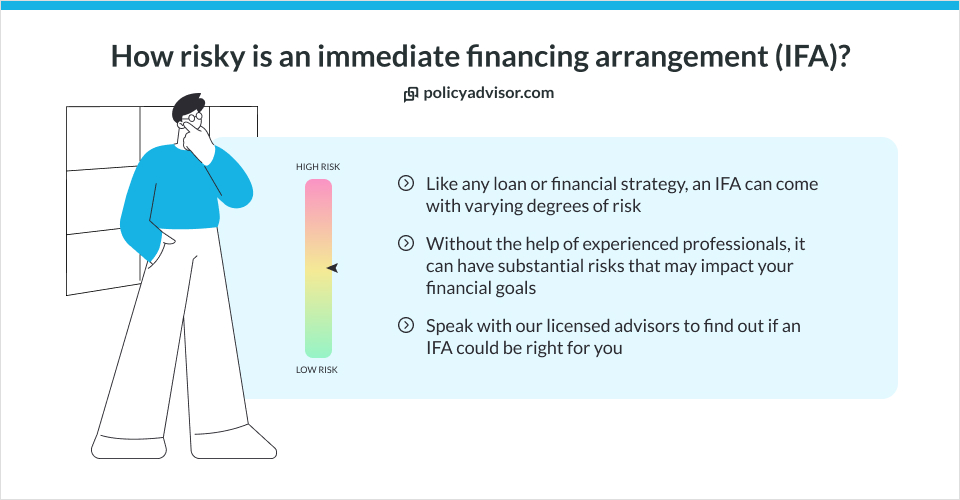- An immediate financing arrangement can come with some risks, but this is no different than many other insurance or financial strategies
- Although an IFA can be risky, it's not necessarily a bad risk — you just have to be careful in your approach
- You should speak to a financial professional before initiating an IFA
An immediate financing arrangement or IFA can be a convenient strategy for people with high incomes, but there are risks involved. Keep reading to find out what those risks are and how you can best avoid them.
What are the risks of an immediate financing arrangement?
Some of the biggest risks of using your life insurance policy for an immediate financing arrangement are:
- Dividend scale fluctuations
- Changing loan interest rates
- Changing terms
- Lower death benefit
- Unexpected changes in your financial situation
- Loss of collateral or assets
- Fees
- Possible credit impact
- Possible tax implications
What is an IFA?
An immediate financing arrangement is a unique insurance strategy where you use a whole life insurance policy as collateral to open a line of credit with a financial institution, such as a bank or lender.
You can instantly access up to 100% of the premiums you paid for the insurance policy, or up to 100% of the cash value. Unlike a regular bank loan or collateral loan, an IFA is literally immediate — you could buy cash value life insurance today and apply for an IFA right now.
Why do people get insurance financing arrangements?
High-income earners in Canada use IFAs as a convenient way to get the benefits of life insurance coverage while also getting liquid assets right away.
It’s especially useful for business owners, private corporations, and other high-net-worth individuals. With an IFA, they can access immediate access to capital without tapping into current income.
Common uses for an IFA
Most people use the proceeds from an IFA for:
In a way, an IFA lets you recoup the amount you paid in premiums, so you can use those funds for revenue-building ventures. You can then use those returns for interest payments on the agreement. An IFA can almost be thought of as paying for itself in that sense.
Is getting an IFA risky in general?
Yes, an IFA can be a risky and complex financial strategy for the reasons we highlighted in this article. But this is not uncommon. Many financial and insurance strategies come with varying degrees of financial risk.
The more important question is what your risk appetite is like, and where an IFA fits on that scale. This is why we always recommend that you speak with a professional before deciding to start an IFA. An experienced advisor can help you ensure your IFA works as planned and gives you maximum benefits.
How to avoid immediate financing arrangement risks?
We, as insurance professionals, understand the risks involved with immediate financing arrangements in Canada, even though they can’t be entirely avoided. Having said that, you can certainly mitigate the risks of getting immediate financing. Here are some tips on how to avoid IFA risks:
Speak with a professional
If you’re thinking about starting an immediate financing arrangement, speak with one of our licensed insurance advisors.
As Canada’s best online insurance broker, we work with more than 30 of Canada’s best life insurance companies. We can help give you tailored guidance about what kind of permanent life insurance policy to use for an IFA or whether that may be the right strategy for your needs.
An immediate financing arrangement is an advanced strategy that can help business owners, investors, and other high-net-worth individuals put their whole life insurance policy to the best use. But, it’s not for everyone. Without the support of experienced professionals, there are substantial risks that may impact your desired financial outcomes. You could end up leaving less funds behind for loved ones, paying more interest than you intended, and more.





